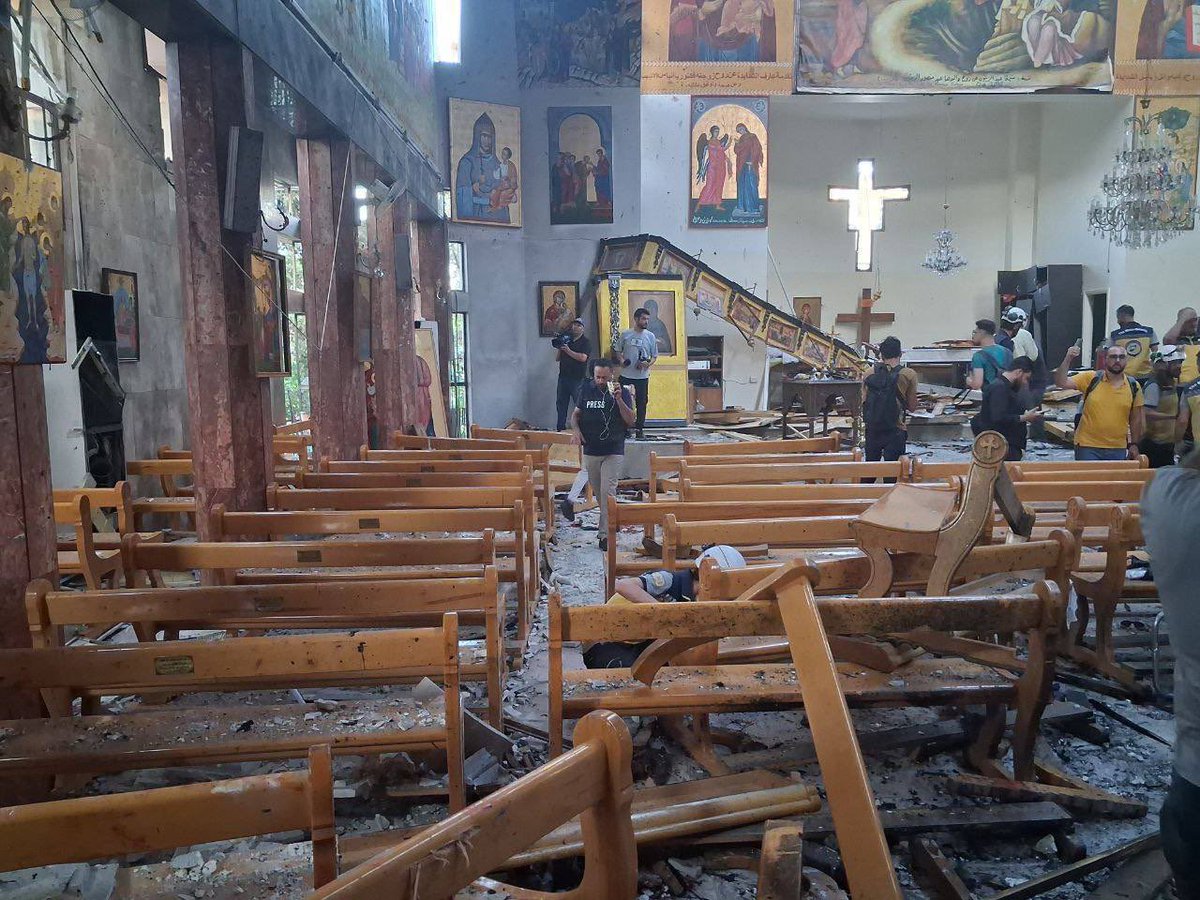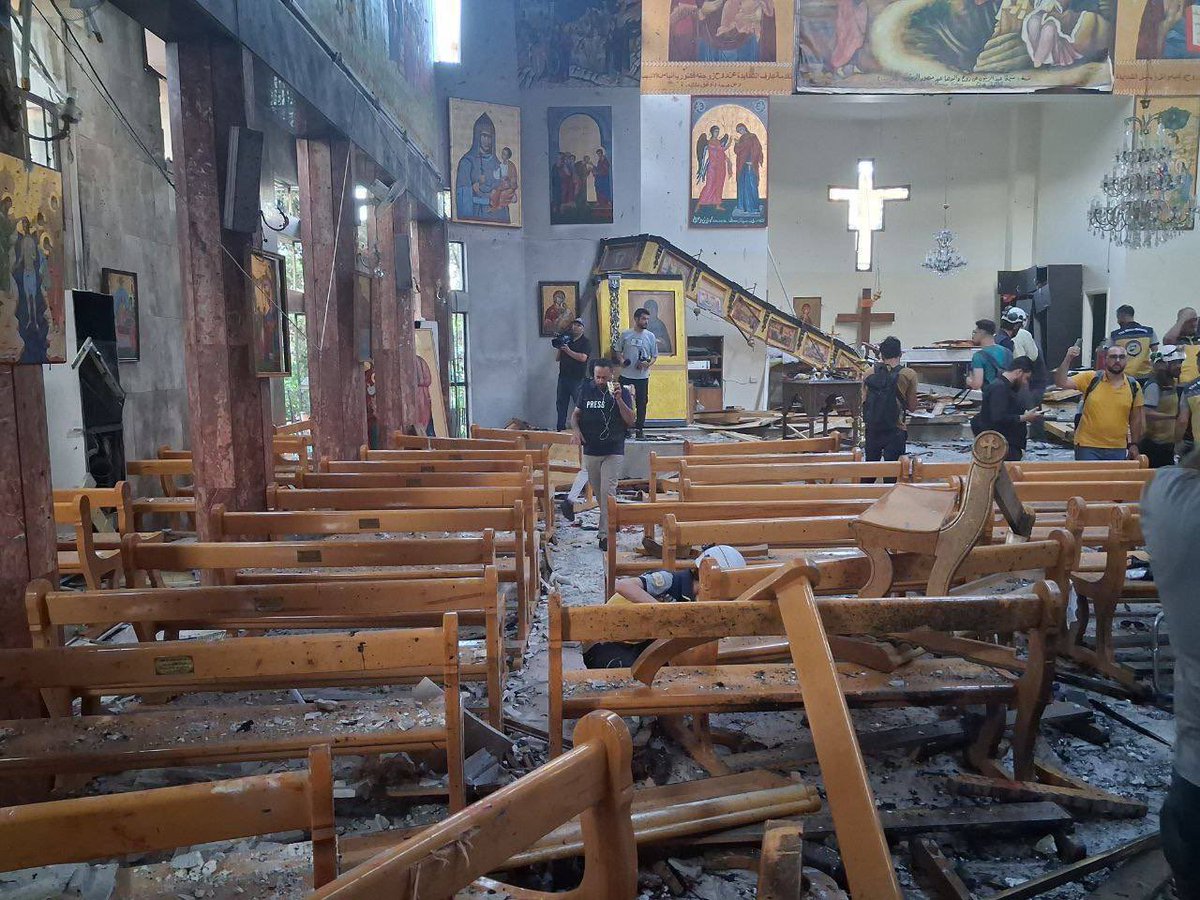ISIS Strikes Again: Church Attack in Damascus Leaves 10 Dead!
Horrifying ISIS Attack on a Church in Damascus
On June 22, 2025, a tragic and horrifying incident occurred in Damascus, Syria, when a suicide attack claimed by ISIS targeted the Greek Orthodox Church of St. Elias. Reports indicate that the attack resulted in the deaths of at least 10 individuals, while over 30 others sustained injuries. This brutal act of violence has once again highlighted the ongoing threat posed by ISIS in the region, particularly as the group has been experiencing a resurgence in recent months.
Background of the Attack
In recent times, the resurgence of ISIS in Syria has raised alarm among local authorities and the international community alike. Analysts attribute this revival to various factors, including the dissolution of the Syrian Arab Army under new leadership. This power vacuum has allowed extremist groups like ISIS to regain a foothold in the region, leading to increased violence and instability.
The Greek Orthodox Church of St. Elias, once a place of solace and community for many, has now become the site of a tragic event that has left the local community in mourning. The attack is a stark reminder of the dangers posed by radical groups and the ongoing conflict that has plagued Syria for over a decade.
Impact on the Local Community
The immediate aftermath of the attack has seen an outpouring of grief and shock from the local community. Families of the victims are left to grapple with the devastating loss, while survivors face the physical and emotional scars of the incident. The church, which served as a sanctuary for many, now stands as a symbol of the violence that continues to disrupt everyday life in Syria.
- YOU MAY ALSO LIKE TO WATCH THIS TRENDING STORY ON YOUTUBE. Waverly Hills Hospital's Horror Story: The Most Haunted Room 502
In addition to the human toll, the attack also raises questions about security in the region. Many residents are left wondering how such an attack could occur in a place that is supposed to be a safe haven for worshippers. The incident has sparked discussions about the need for enhanced security measures in religious institutions and public spaces to protect against future attacks.
The Resurgence of ISIS
The resurgence of ISIS in Syria is not just a localized issue; it is part of a broader pattern of extremist activity in the region. The group has been known for its brutal tactics and ideologies, which have led to widespread devastation and suffering. As the Syrian conflict continues, ISIS has sought to exploit the chaos and instability to re-establish its influence.
Experts suggest that the recent attacks are a strategic move by ISIS to regain its standing and instill fear among the populace. By targeting places of worship, the group aims to create divisions among communities and undermine the social fabric of Syrian society. This tactic not only serves to instill terror but also seeks to provoke a response from both local and international forces.
The International Response
The international community has condemned the attack, with various governments and organizations expressing their solidarity with the victims and their families. Such acts of violence are met with strong denunciation, but the challenge remains in effectively addressing the root causes of extremism in the region.
Efforts to combat ISIS have been ongoing, with various military and humanitarian initiatives aimed at stabilizing Syria. However, the resurgence of the group highlights the complexities involved in achieving lasting peace and security. Many analysts argue that a multifaceted approach is necessary, one that addresses not only the military aspects of the conflict but also the socio-economic conditions that allow extremist ideologies to thrive.
Conclusion
The horrific attack on the Greek Orthodox Church of St. Elias in Damascus serves as a chilling reminder of the ongoing threat posed by ISIS and similar extremist groups. As the community mourns the loss of life and grapples with the consequences of violence, it is imperative for local and international actors to work together to restore security and promote peace in the region.
The resurgence of ISIS underscores the need for a comprehensive strategy that not only addresses immediate security concerns but also tackles the underlying issues that contribute to extremism. Only through a concerted effort can communities in Syria hope to heal and rebuild in the wake of such devastating attacks.
As we remember the victims of this tragedy, it is crucial to remain vigilant and committed to combating the forces of extremism that threaten so many lives. The attack on the church is not just an isolated incident; it is part of a larger narrative of conflict and resilience that continues to unfold in Syria and beyond.

A horrifying ISIS attack on a church in Damascus
10 killed & at least 30 injured. The suicide attack struck the Greek Orthodox Church of St. Elias.
In recent months ISIS has started to resurge in Syria, after the new leadership dissolved the Syrian Arab Army. pic.twitter.com/OfyLkw4JPg
— MintPress news (@MintPressNews) June 22, 2025
A horrifying ISIS attack on a church in Damascus
On June 22, 2025, a tragic event unfolded in Damascus that left the world in shock—a horrifying ISIS attack on a church. The Greek Orthodox Church of St. Elias became the target of a brutal suicide bombing that claimed the lives of 10 individuals and injured at least 30 others. This incident not only highlights the ongoing violence in the region but also raises concerns about the resurgence of ISIS in Syria, particularly after the recent dissolution of the Syrian Arab Army.
Understanding the Attack
The attack on the Greek Orthodox Church of St. Elias is a grim reminder of the persistent threat posed by extremist groups like ISIS. As people gathered in the church for a religious service, the suicide bomber struck, resulting in chaos and devastation. Eyewitness accounts describe a scene of horror, with many innocent lives lost and countless others affected. It’s a stark example of how places of worship, which should be sanctuaries for peace and reflection, have become targets for violence.
The targeting of churches and religious minorities raises urgent questions about the security of such institutions in conflict zones. The attack in Damascus is not an isolated incident; rather, it reflects a broader pattern of violence against Christians and other minority groups in the Middle East. Many Christian communities have faced persecution and violence, and this attack serves as a painful reminder of their precarious situation.
The Rise of ISIS in Syria
In recent months, ISIS has been showing signs of resurgence in Syria. After the new leadership dissolved the Syrian Arab Army, the power vacuum allowed extremist groups to regain a foothold in the region. ISIS, which had been largely defeated in previous years, is now attempting to re-establish its influence. This resurgence poses a significant threat to the stability and security of not just Syria, but the entire region.
Analysts suggest that the dissolution of the Syrian Arab Army has created an environment where extremist ideologies can flourish. With security forces weakened, ISIS has been able to exploit the situation, launching attacks that instill fear and undermine any hopes for peace. The international community is now faced with the challenge of addressing this revival of extremism and protecting vulnerable populations.
The Impact on Local Communities
The repercussions of the attack on the Greek Orthodox Church of St. Elias are far-reaching. For the local Christian community in Damascus, this incident not only represents a tragic loss of life but also a deepening sense of insecurity. Many community members are left grappling with fear and uncertainty about their future in a country that has been ravaged by years of conflict.
In the wake of the attack, community leaders are calling for increased security measures to protect places of worship and to ensure the safety of religious minorities. However, the question remains: how can these communities be safeguarded in an environment where extremist violence is on the rise? The international community must step up efforts to provide support and protection to these vulnerable groups.
The Need for Global Awareness and Action
Addressing the threat posed by ISIS and other extremist groups requires a concerted effort from the global community. Awareness of the situation in Syria is crucial; many people may not fully understand the complexities and dangers that exist. By shining a light on these issues, we can encourage more significant international action and support for those affected by violence.
The attack on the Greek Orthodox Church is a wake-up call for all of us. It serves as a reminder that the struggles faced by communities in Syria are not just distant headlines but matters that require our attention and compassion. Advocacy for peace, security, and the protection of religious minorities must become a global priority.
The Role of Media in Reporting Violence
The media plays a vital role in shaping public perception and understanding of events like the horrifying attack in Damascus. Accurate and responsible reporting can raise awareness and foster empathy for those affected by violence. However, sensationalized coverage can also lead to misinformation and fear-mongering.
It’s essential for media outlets to approach stories of violence with sensitivity, focusing on the human impact rather than just the sensational aspects of the events. By highlighting personal stories and the resilience of communities, the media can help foster a more profound understanding of the challenges faced by those living in conflict zones. Responsible reporting can also encourage international dialogue and action, as people become more aware of the human cost of violence.
Building Resilience in Affected Communities
In the aftermath of such tragic events, resilience becomes a crucial factor for affected communities. Support systems, both locally and internationally, can play a significant role in helping individuals and families cope with trauma and loss. Community leaders and organizations can work together to provide counseling, resources, and a sense of solidarity for those impacted by violence.
Moreover, fostering dialogue between different religious and ethnic groups can help build bridges and promote understanding. Initiatives aimed at reconciliation and peacebuilding are essential in creating a more inclusive society where everyone, regardless of their faith, can feel safe and valued.
The Path Forward: A Call to Action
The horrifying attack on the Greek Orthodox Church of St. Elias in Damascus should serve as a rallying point for action against extremism. It’s a stark reminder that the fight against terrorism is far from over, and the protection of vulnerable communities must be a priority. International cooperation, awareness, and advocacy are vital in addressing the root causes of violence.
As individuals, we can contribute by educating ourselves about the situation in Syria and supporting organizations that work to protect those affected by violence. Whether through donations, volunteering, or simply spreading awareness, every action counts in the fight for peace and justice.
In summary, the attack on the church in Damascus is a tragic chapter in the ongoing story of conflict and extremism in the region. By raising our voices and advocating for change, we can work towards a future where places of worship are safe havens, and communities can thrive in peace. Let’s stand in solidarity with those affected and strive for a world free from fear and violence.

